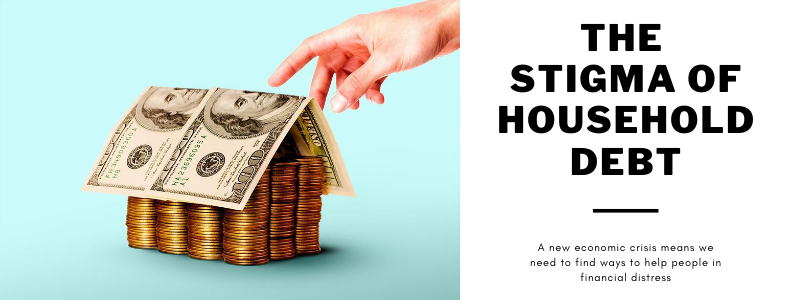
Household debt is an issue many are hesitant to talk about. 80% of people who owe money don’t seek help, instead hiding their financial problems from fiends and family. The concept of household debt is a consumer’s total debt within a home, which can include debt through credit cards, student loans, leases, mortgages, and business loans. In the late 20th Century, households made a paradigm shift from saving money to starting to rely more on borrowing, where stigma surrounding debt became more commonplace as the rates of bankruptcy within the middle class rose. The stigma around household debt has negative effects on a person’s life socially by damaging their financial reputation, leading to bad credit, concerns about employability and mental health issues. Despite these roadblocks previously preventing a dialogue around the issue, the circumstances and severity around debt in 2020 might leave room to make attitudes change.
As household debt in the UK has become the highest it’s ever been on record, many lower income households finds themselves unable to save money at all, increasing these households’ vulnerability in times of financial insecurity. Households unable to make ends meet have been said by the Office of National Statistics “to be living beyond their means”.
Blaming of borrowers often occurs whenever the topic of household debt comes up. The notion that debtedness is the fault of the individual, is often fuelled by soundbites and stories in the media. Society promotes the idea that it is a self-inflicted punishment for something one person has done, because they’re the ones signing up to credit cards, taking out loans, repaying the mortgage. But most household debt isn’t because people are frivolous like many presume. Rather, it is caused by reductions of wages and benefits, redundancy, and illness. According to Stepchange’s Scotland in the Red Report, before COVID-19 the main cause of household debt was ‘life events’, Life events are classified as unexpected shocks that put a burden on a person’s finances. In many cases, such events are costly burdens that complicate a person’s life, with no room for flexibility.
With a third of people being affected financially by COVID-19, a wide range of people have experienced a ‘life event’ that has affected them financially. An estimated 4 million people have been added to the number with substantial household debt since the crisis began. This begs the question of whether or not this will pave the way for people to talk about their debts and how it affects them.
At the same time, The Bank of England stated that £7.4bn of consumer credit was repaid during the first month of lockdown, the biggest net repayment in a month since 1993. A huge reduction in retail spending led to this, with the outstanding debts on credit cards remaining at £64bn. This positive sounding news demonstrates how the lockdown has added to the wealth divide in the UK. People who were able to keep working can see their debts cleared from a lack of incentive to spend, while many workers being hit by job losses and cut wages take on more debt while on furlough. If this trend continues we are unlikely to see a decrease in stigma associated with debt. It’s possible that these figures could be used by creditors to present a distorted version of events when payment holidays end, adding to the guilt of people who are unable to repay when so many others could.
A poll conducted by Citizens Advice Scotland this summer found that 1 in 4 Scottish people were concerned about their debt repayments. In response to these findings a spokesperson for the Scottish Government said that “We recognise the stress and strain debt can create and we would encourage anyone with concerns to contact organisations such as CAS to get advice and support.” While this statement acknowledges the fact that it’s a stressful time for people in debt, it passes the buck of having a conversation about debt back onto the charities that have already done so much to bring the issue to the foreground. Along with voting down the recent plans for rent controls, the Scottish Government hasn’t done much to address people’s heightened debt concerns.
A reduction of the stigma around household debt is necessary to widen the conversation on the topic and increase the pressure on government and public lenders to make systematic changes to our flawed financial system. To make this happen we have to harness the shared experience of COVID-19’s impact on household debt. People should not be treated like criminals for the chaotic circumstances that life throws at them. The conversation needs to be facilitated in a way where the Scottish government talks about personal debt, in a transparent way that makes people feel heard instead of at risk for speaking out. If we don’t talk about the devastating impact of household debt openly and address the scale of the problem, we won’t build back as a better society.




Leave a Reply